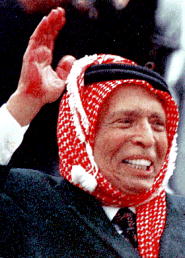 Jordan a river of of tears for the father of nation By Alan Philps, Middle East Correspondent, The Daily Telegraph, 5-2-1999 There were tears in the streets of Jordan and in its citizens' homes last night as King Hussein flew back from America to die after losing his battle against cancer. "It's just not fair. Our king, only 63, is being taken away from us," said one weeping mother of two. Not a word of the true state of the king's health was said in the official Jordanian media. As Jordan television kept up its usual schedule, the main news announced only that the monarch was returning to continue treatment at the Hussein Medical Centre in the capital, Amman. But the official reticence fooled few Jordanians. A newspaper editor said: "We are used to reading the signals, and the signals could not be worse. All we want to know is, will it be days or months?" The bond between Hussein and his people cannot be exaggerated. On the throne for 46 years, he is such a fixture that few of his subjects remember any other monarch. While in other Arab countries the leader's portrait hangs everywhere on public buildings, in Jordan it is placed on the mantelpiece, among the family snaps. He is the father of the nation. Last night, no one was talking of the geo-political consequences of his demise. A travel agent said: "It is not a question of what will happen to Jordan now, it's between us and the king. Everyone is in emotional distress." The King's popularity stemmed partly from his character. With exquisite manners and a soldierly affability, he was equally at ease talking to presidents as sipping coffee around the hearth of a Bedouin tent. His departure will leave a gaping hole at the heart of the state, which he created almost single-handed after the assassination of his grandfather, King Abdullah, in Jerusalem in 1951, when he was only 15. Hussein was thrust on to the throne shortly afterwards, when his father, Talal, proved mentally unstable. 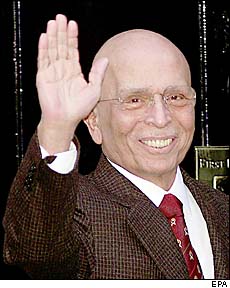 The kingdom of Jordan was created by Britain when it needed a throne for Hussein's grandfather at the end of the First World War. It has almost no resources and an explosive population mix of Bedouin tribesmen from the east bank of the Jordan and Palestinian refugees from the west bank. From these unlikely beginnings, Hussein built up a country that is reasonably prosperous and tolerant, by Arab standards. For decades it has been the linchpin of Middle East peace efforts, a vital buffer between Israel on one side and Syria, Iraq and Saudi Arabia on the other. For Israel, the loss of King Hussein will be a bitter blow. He was the only Arab leader whom the Israelis could see as a friend, a symbol of the distant possibility of the Jewish state living in peace with its neighbours. After decades of secret contacts with Israeli leaders, King Hussein signed a peace treaty with the Jewish state in 1994. It was not popular at the time - most of the population are Palestinians who lost their homes to Israel - and it has become less popular since, as the treaty failed to yield full peace or any economic benefits. But while the King was in charge, Jordanians accepted his judgment. It will not be easy for his successor, Crown Prince Abdullah, 38, to acquire such prestige. Israel has already expressed fears about subversion from Syria, while the presence of Saddam Hussein as president of neighbouring Iraq is cause for concern. 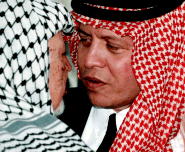 The King Abdallah II greet the Palestin leader, Yasser Arafat (9-2-1999) Fears for the future are compounded by the King's final act - of naming Abdullah as Crown Prince, in place of his brother, Hassan, who had been the designated heir for three decades. As a military man respected in the army and with good contacts in the powerful intelligence services, Abdullah looks reasonably secure on the throne. But diplomats agree that he would benefit from a lengthy tutelage from his father. He has spent his life in the military and has none of the diplomatic experience of Prince Hassan, who acted as regent countless times when his brother was abroad. 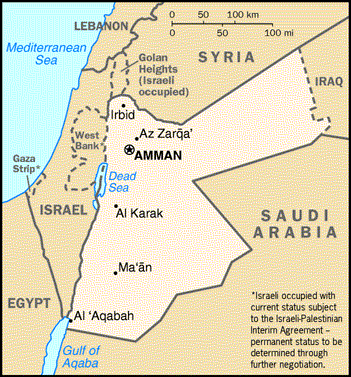 The Hussein years: 1935 to 1999 1935 November: Hussein born in Amman on November 1 1946 May: Jordan declares independence in May from Britain which held mandate since the end of the First World War. 1948 May: Jordan joins the first Arab- Israeli war to stop Israel from occupying the whole of Palestine after the withdrawal of British troops. 1951 July: Witnesses assassination of his grandfather, King Abdulluh 1952 August: A 16-year-old Crown Prince Hussein is declared King of the Hashemite Kingdom on August 11 after his father's abdication due to poor mental health. 1956 March: King Hussein sacks Glubb Pasha, the British Commander-In-Chief of the Jordanian armed forces. Starts eliminating foreign influence in the army. 1958 February: Abortive federation between Jordan and Iraq. Ends in July with the assassination of King Faisal of Iraq, King Hussein's cousin. 1961 May: King Hussein marries Leedsborn Toni Gardiner, later known as Princess Muna. A year later Prince Abdulluh is born 1965 April: King Hussein amends the constitution to allow his brother, Prince Hassan bin Talal, to become heir. 1967 June: Jordan joins the second Arab-Israeli war and loses the West Bank and Arab east Jerusalem. Massive exodus of Palestinian refugees to Jordan. 1970 September: 'Black September' civil war. Jordanian Army launches an offensive to regain control of the country from Palestinian guerrillas. Violent clashes in Amman leave between 3,000 and 5,000 dead. 1988 July: After outbreak of Palestinian intifada against Israel, Jordan breaks off all links with the West Bank. Hussein remains custodian of the Dome of the Rock and Al-Aqsa Mosque in Jerusalem. 1990 August to February 1991: During the Gulf crisis Jordan denounces Iraq's invasion of Kuwait but appears reluctant to apply sanctions on Baghdad. 1993 November: First multi-party legislative elections. Most seats are won by independents close to the Government. 1994 October: Jordan signs a peace treaty with Israel putting an end to a 46- year-long state of war. 1995 January: Palestinian leader Yassir Arafat visits Amman. A series of co-operation accords are signed. 1999 January: King Hussein, declaring himself cured of non-Hodgkin's lymphoma, returns to a triumphant welcome in Amman on January 19. Appoints Prince Abdulluh, his eldest son, as heir to the throne February 4: In critical condition after the failure of a bone marrow transplant in US returns home to die. February 7: The King Hussein is die. Jordania lose their King and the world tribute the figure of the "Champion of the peace". 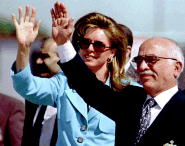 |
